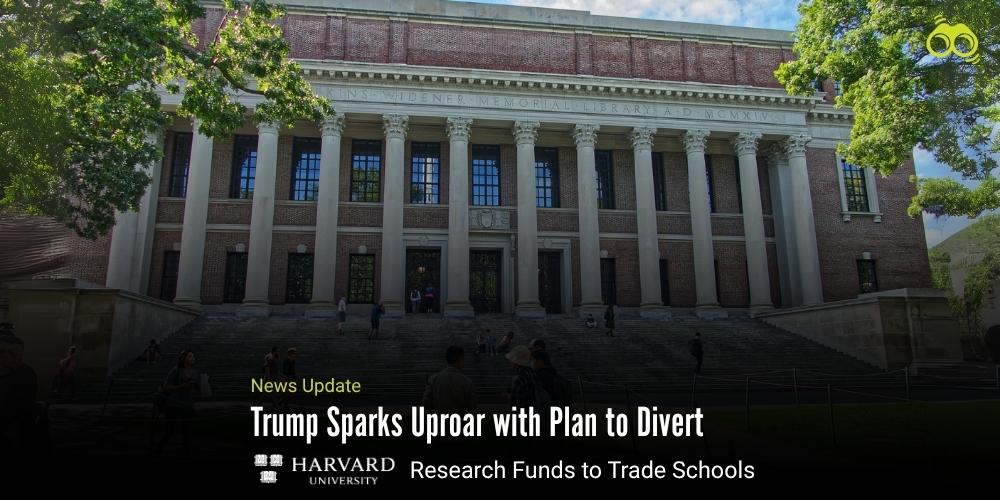Harvard Sues Trump Administration Over $3 Billion Funding Freeze
Trump Freezes Harvard Grants, Proposes Shift to Trade Schools
The ongoing tensions between former U.S. President Donald Trump and Harvard University have once again come to the forefront, with Trump considering a significant financial shift that could impact the academic landscape of the United States. On 26 May, reports emerged that he had announced plans to redirect $3 billion in previously awarded scientific and engineering research grants from Harvard to trade schools, a move that signals a renewed effort to challenge the influence of elite institutions.
This latest development follows previous attempts by Trump’s administration to restrict Harvard’s enrollment of foreign students, a step widely interpreted as an attempt to exert greater government control over higher education. The conflict between Trump and one of the country's most renowned universities highlights broader debates over education funding, elitism, and political intervention in academic affairs. Trump, a Republican, has reportedly frozen around $3 billion in federal grants to Harvard, accusing the university of hiring Democrats and what he described as “Radical Left idiots” and “bird brains.” In response, Harvard has filed a lawsuit to restore the funding, arguing that the move is an unconstitutional attack on free speech and an unlawful act. Most of the frozen funds were originally allocated by Congress to the National Institutes of Health (NIH) for biomedical research, typically awarded to individual scientists through a competitive process, research not commonly conducted at trade schools.
However, it remains uncertain whether Trump was referring to the same grants that his administration had already frozen. Harvard stated that, earlier in May, it had been notified that nearly all its federal grant awards had been revoked by agencies such as the NIH, U.S. Forest Service, Department of Energy, and Department of Defence, which cited that the funds “no longer affect agency priorities.” As of Monday, Harvard had not issued a response, and the White House has provided no details on which funds Trump intends to redirect to trade schools or how such a move would be legally executed.
Furthermore, on 23 May, reports indicated that a U.S. judge had temporarily blocked the Trump administration’s efforts to prevent Harvard from enrolling foreign students. The university has argued that the policy forms part of a wider attempt by Trump to retaliate against it for maintaining its academic independence. According to Harvard, the policy represents a "blatant violation" of the U.S. Constitution and federal law and threatens to force thousands of international students to transfer. The university also warned that such a move could have an "immediate and devastating effect" on its operations and on the more than 7,000 students holding international visas.
Notably, nearly 6,800 international students were enrolled at Harvard this academic year, comprising 27% of its student body and contributing significantly to tuition revenue. The dispute is part of a broader conflict between Harvard and the Trump administration, as Trump continues efforts to align institutions such as universities and media outlets with his political agenda, often accusing elite schools of left-wing bias. In recent weeks, reports suggest that the Trump administration has escalated actions against Harvard by proposing to revoke its tax-exempt status, increase taxes on its endowment, and investigate alleged discrimination against white, Asian, male, or straight individuals in hiring and admissions. In response, Harvard has maintained that its practices fully comply with federal law. This escalating conflict between Trump and Harvard University underscores the intersection of politics and academia, with far-reaching implications for the future of higher education in the United States.
Editor's Note:
The shifting policies of the former U.S. President Donald Trump are sending ripples through the landscape of higher education, raising pressing concerns about academic independence and funding stability. His recent decision to freeze $3 billion in federal grants to Harvard and consider redirecting them to trade schools signals an attempt to reshape the priorities of American education. While vocational training is undeniably valuable, stripping critical research funding from one of the world's leading institutions undermines scientific progress and innovation, both of which have long benefited from government support. Moreover, Trump's ongoing efforts to restrict international student enrollment and challenge universities over perceived political biases threaten the diversity and global reputation of U.S. higher education. Such moves risk deterring talented students and researchers from contributing to American academic excellence.
As per Skoobuzz, these policies highlight a growing tension between political influence and institutional autonomy, raising fundamental questions about the future of education in the United States.














0 Comments (Please Login To Continue)